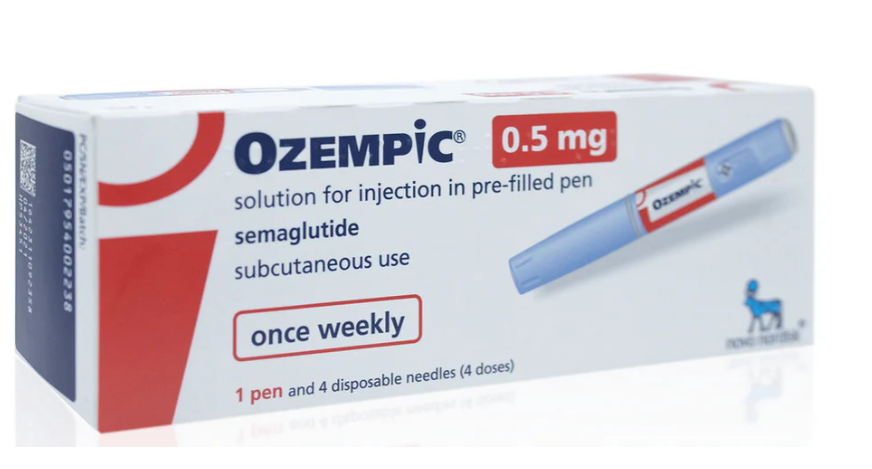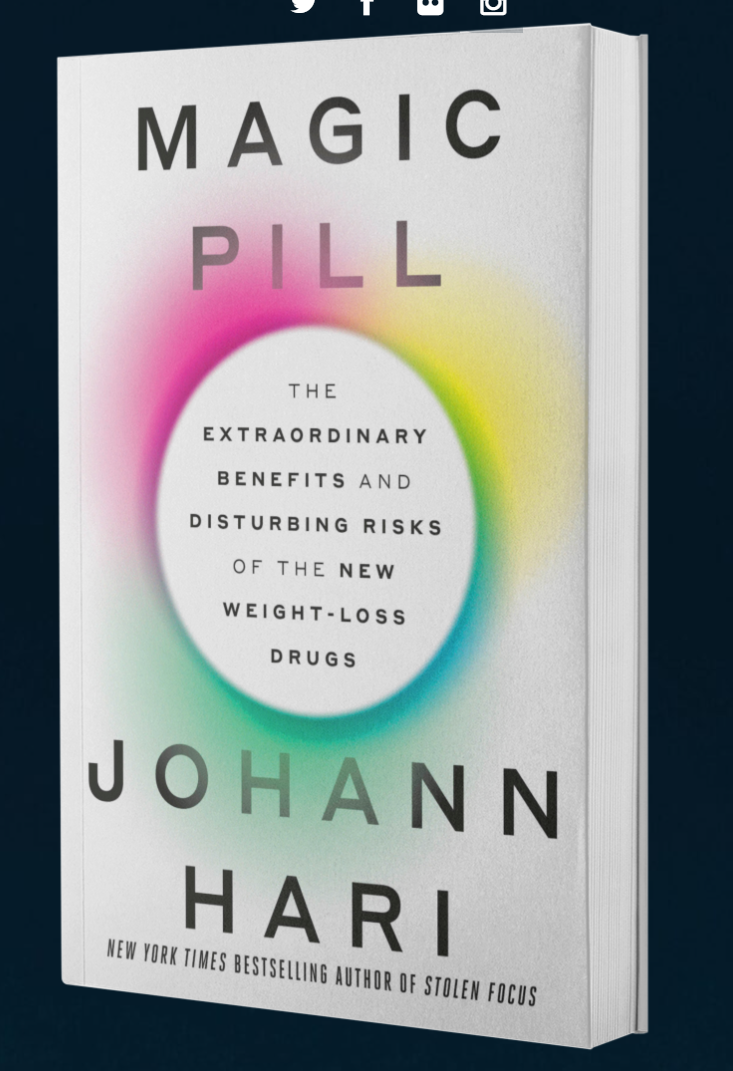Worth the weight? Best-selling author recounts his Ozempic journey
Congratulations, Ozempic — you’ve done it.
You’ve reached truly rarefied air in terms of brand name recognition.
Just like Kleenex for tissue paper and Vaseline for petroleum jelly before you, in just a few short years you’ve become shorthand for an entire product category.
In your case it’s the new class of type 2 diabetes and weight-loss medications that act as “agonists” for glucagon-like peptide 1 (GLP-1) receptors.
According to the Mayo Clinic, “these drugs mimic the action of a hormone called glucagon-like peptide 1. When blood sugar levels start to rise after someone eats, these drugs stimulate the body to produce more insulin. The extra insulin helps lower blood sugar levels. Lower blood sugar levels are helpful for controlling type 2 diabetes. But it's not clear how the GLP-1 drugs lead to weight loss. Doctors do know that GLP-1s appear to help curb hunger. These drugs also slow the movement of food from the stomach into the small intestine. As a result, you may feel full faster and longer, so you eat less.”
Nearly 1 in every 10 Americans forecast to be using Ozempic by 2035
Last month NBC News reported that 6% of U.S. adults are taking some form of GLP-1 receptor medication and, as production ramps up to meet ever-increasing demand, Morgan Stanley predicts that by 2035, 9% of the nation — some 32 million Americans — will be on it.
Cosmetic doctors are already promoting solutions for “Ozempic face.”
Later this year, Nestlé will introduce a frozen food brand called Vital Pursuit, whose offerings will be specifically catered to GLP-1 receptor users.

Major retailers like Walmart and Target are starting to alter the size and stocking of some of their grocery items in anticipation of potential changes in eating habits.
Even major airlines reportedly are anticipating that they’ll be able to spend less on jet fuel as the passengers they transport become lighter.
With the effect GLP-1 receptor medications have already had on society — and what these drugs are poised to do in the future — New York Times best-selling author Johann Hari’s new book, "Magic Pill: The Extraordinary Benefits and Disturbing Risks of the New Weight-Loss Drugs," could not have been released at a more opportune time.

Author's journey began at 200-plus lbs.
Like so many people during the COVID-19 lockdown, Hari — a self-described junk-food junkie — gained a considerable amount of weight.
At his heaviest, the 5-foot, 8-inch Scottish author weighed more than 200 pounds.
In "Magic Pill," he recounts his own Ozempic journey — which started in January 2023 and resulted in a 42-pound weight loss.

As he writes “the moment I learned about the new weight-loss drugs, I felt immediately and intensely conflicted. I could see the benefits. I was, at the age of 44, older than my grandfather ever got to be, because he died of a heart attack ... But I was also very resistant. I asked myself: Can you really get these benefits without bringing on a whole new set of risks?”
He was also hesitant about giving up what he’d long used to self-soothe: food.
“At a deeper level, I got a lot of comfort and calm every day from overeating junk food,” he writes. “Could I cope without it? To find the answers, I took the drugs for a year, and went on a journey all over the world — from Iceland to Japan — to interview the leading experts on what these drugs are doing to us.”
During his recent promotional tour for "Magic Pill," Hari recounted some of the things he learned when speaking to experts.
For instance, he said “Karel Leroux, who's the South African psychiatrist who played a key role in the development of these drugs, said to me, what these drugs do is they give you satiety hormones. They give you back the sense that you can be full.”
More: Was Oprah's apology even necessary or was she a product of the body-shaming times?
He also mentioned how impactful he found a passage from “food writer Bee Wilson’s book 'First Bite.' In it, she explains, ‘Eating is not something we are born instinctively knowing how to do, like breathing. It is something we learn...The reason so many find it hard to eat healthily is that we have never learned any differently.’”
Experts explained to Hari that the typical American diet of processed and ultra-processed food has robbed us of our biological ability to monitor our sense of hunger.
As Drexel University professor Michael Lowe, one of the nation’s experts on hunger, put it to Hari, GLP-1 receptor medications “are an artificial solution to an artificial problem.”
Little demand for Ozempic in Japan
In traveling the world, Hari was particularly impressed with the Japanese approach to food — specifically, that they never allowed processed and ultra-processed foods to become their go-to choices.
In fact, he found out that processed foods are illegal in Japanese schools and that just 4% of the Japanese population is overweight or obese.
As he explained on his promotional tour, Japanese meals “generally have five portions but they're all smaller, so you have a bigger variety. That's better for your gut health.”
Also, the cultural norm is to eat until one is just 80% full — and this approach is ingrained early on, both at home and school.
“Every school employs a nutritionist whose job is to feed the kids fresh food and use that fresh food to educate the kids about how to eat,” said Hari.
But Hari also noted that the Japanese “don’t restrict themselves” and enjoy delicious food at every meal.
“They love food and created a culture of loving healthy food — and that was consciously designed,” he explained.
And that’s why there’s no market for GLP-1 receptor medications in Japan.
Balancing the pros and cons
Hari’s exploration of GLP-1 receptor medications is comprehensive and nuanced.
The risk-reward calculus is different for every individual and the long-term outlook for these drugs, as well as the long-term effects they have on users, will need to be continually monitored by both healthcare professionals and researchers.
As Hari wrote in Daily Mail in April, “most of the scientists I interviewed are confident that these new-generation drugs are broadly safe, because they have been used to treat diabetes for more than 15 years, without many negative effects — this is an important point. But from studying the science, I learned there are, in fact, several significant potential risks from these drugs ... that should be taken seriously.”
For instance, in the Daily Mail piece he cites a French researcher’s findings that, over a 12-year period, people who took the drugs for three years for type 2 diabetes had a 50% to 75% higher chance of developing thyroid cancer than type 2 diabetics who didn’t take the drugs.
In "Magic Pill," he delves into other potential risks, including those for pregnant women “because animal studies produced birth abnormalities,” as well as muscle wasting, malnutrition, slower metabolism, nausea, vomiting, and gastric distress, among others.
All medications come with potential side effects — but obesity decreases life expectancy for a myriad of reasons.
That’s why Hari — who wrote in the Daily Mail piece that he's still taking Ozempic — concludes that “the more I looked, the more I realized there are no simple answers here.”
This article originally appeared on Palm Beach Post: Author examines his own use of Ozempic, taps experts for pros, cons




